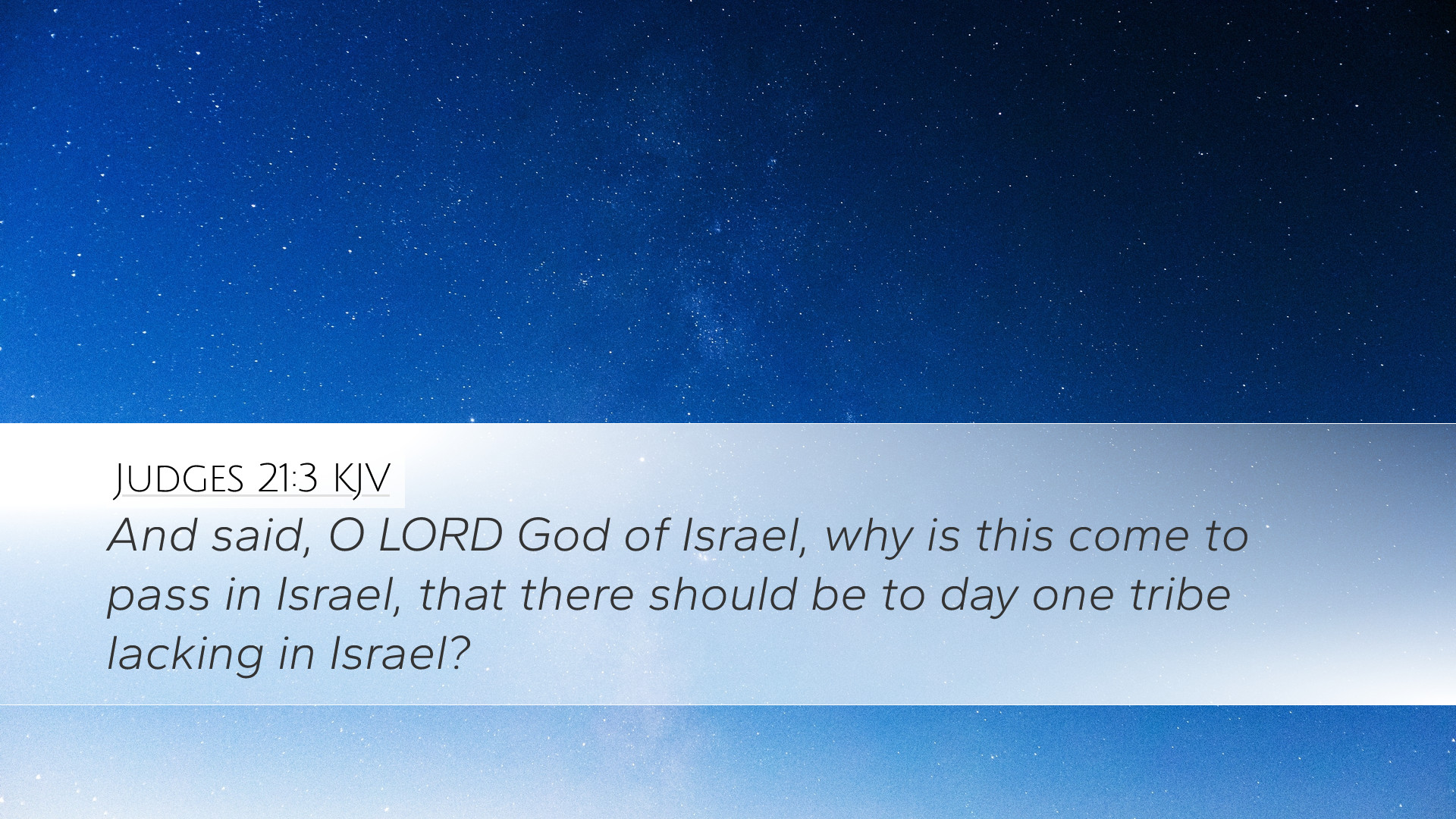Bible Commentary on Judges 21:3
Judges 21:3 presents a unique situation that highlights the desperate circumstances of Israel after the events of the civil war against the tribe of Benjamin. The verse reads:
"O Lord, what shall I do to these people? They are almost ready to perish."
Contextual Background
The context of this verse lies within the broader narrative of the book of Judges, which chronicles Israel's cycles of sin, oppression, repentance, and deliverance. The brutality of the conflict and the subsequent decisions made by the leaders of Israel set the stage for understanding this poignant plea.
-
Historical Context: After a horrific crime against a Levite's concubine in Gibeah, the Israelite tribes united to exact justice. The ensuing conflict nearly annihilated the tribe of Benjamin, leading to deep emotional and spiritual crises among the Israelites.
-
Theological Implications: The desperation expressed in the cry of the Israelites brings forth questions of identity, belonging, and divine justice. It underscores the consequences of sin within the community of faith and the longing for divine guidance in times of turmoil.
Commentary Insights
Matthew Henry's Commentary
Matthew Henry reflects on the deep sorrow and moral confusion that the Israelites faced. Their inquiry before the Lord showcases a recognition of their vulnerability and the dire need for divine intervention. Henry notes:
"Their resolution to seek the Lord indicates a shift towards repentance, acknowledging that the resolution of their plight requires divine insight rather than mere human strategy."
Henry emphasizes the collective anguish of Israel, stating that their status as a hurt community warranted a communal approach to searching for answers from God, illustrating the concept that true repentance must be communal and not just individual.
Albert Barnes' Commentary
Albert Barnes provides a reflective analysis of the significance of the Israelites' lamentation. He notes:
"The question posed to God reflects both a deep recognition of their precarious situation and a theological engagement with God's plan for Israel. It reveals their interdependence on God in their re-establishment."
Barnes also highlights the importance of asking God for guidance rather than relying solely on human wisdom, suggesting that this question points to the need for divine intervention in all matters of life.
Adam Clarke's Commentary
Adam Clarke accentuates the emotional depth of the Israelites' plea and provides a historical perspective. He remarks:
"The lamentations of the people reveal a heartbroken nation; they stand at a crossroads, realizing that without regeneration and divine help, their future is bleak."
Clarke further emphasizes that their commitment to turning to God during crises illustrates a foundational principle of covenant community—that their identity and purposes are irrevocably tied to their Creator. His commentary brings forth the significance of seeking divine counsel in the face of despair.
The Key Themes
-
Desperation and Mourning: Understanding the emotional weight of their situation is essential. Their cry encapsulates not only a request for guidance but also an expression of mourning for their lost kin and the chaos within the community.
-
The Role of Divine Guidance: This verse serves as a powerful reminder to always seek God's will in difficult circumstances. The dependency on divine wisdom reflects a crucial aspect of walking in faith.
-
Community Restoration: The Israelites' collective struggle emphasizes the need for community healing and restoration as they seek to navigate the path forward.
Applications for Pastors and Theologians
For pastors and theologians, Judges 21:3 presents several meaningful applications:
-
Encouragement to Seek Divine Guidance: In times of crisis, congregations must be encouraged to turn to God for wisdom and direction rather than relying on merely human solutions.
-
Importance of Collective Repentance: The narrative urges an emphasis on corporate sin and the community's need for collective return to God. Pastoral leaders can facilitate communal laments and prayer as ways to navigate communal brokenness.
-
Understanding the Nature of Suffering: The themes of suffering and redemption can be explored deeply, allowing believers to find solace and understanding in their trials while trusting that God’s sovereignty remains intact.
Conclusion
Judges 21:3 encapsulates a moment of emotional turmoil that opens a pathway to divine engagement. As the Israelites cried out with desperation, their need for direction serves as a timeless reminder of the importance of seeking God’s will in all circumstances. Through the integrations of insights from Matthew Henry, Albert Barnes, and Adam Clarke, this commentary serves not only as a historical reflection but as an encouragement for believers to remain dependent upon God in both personal and communal crises.


